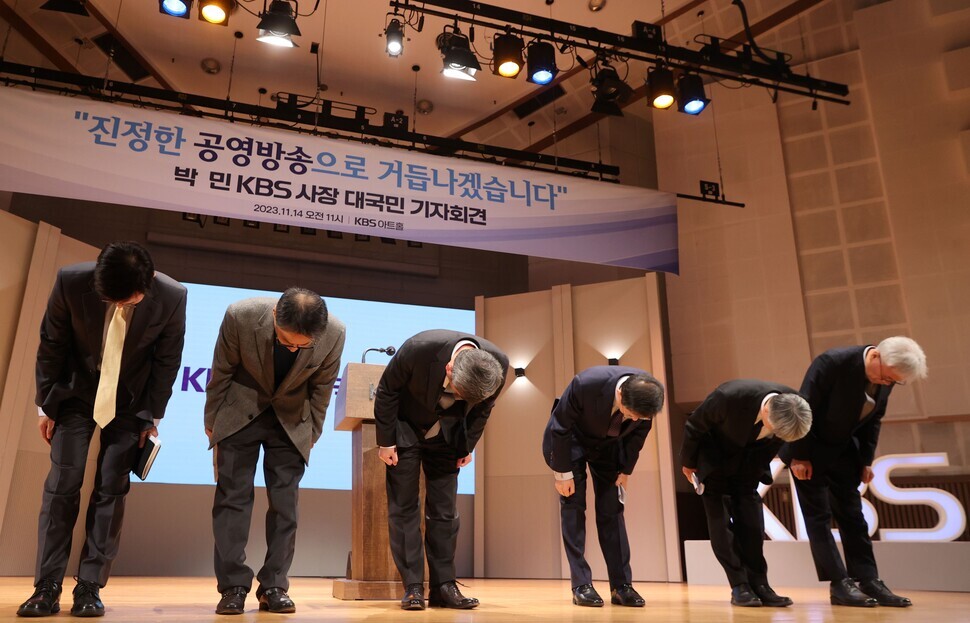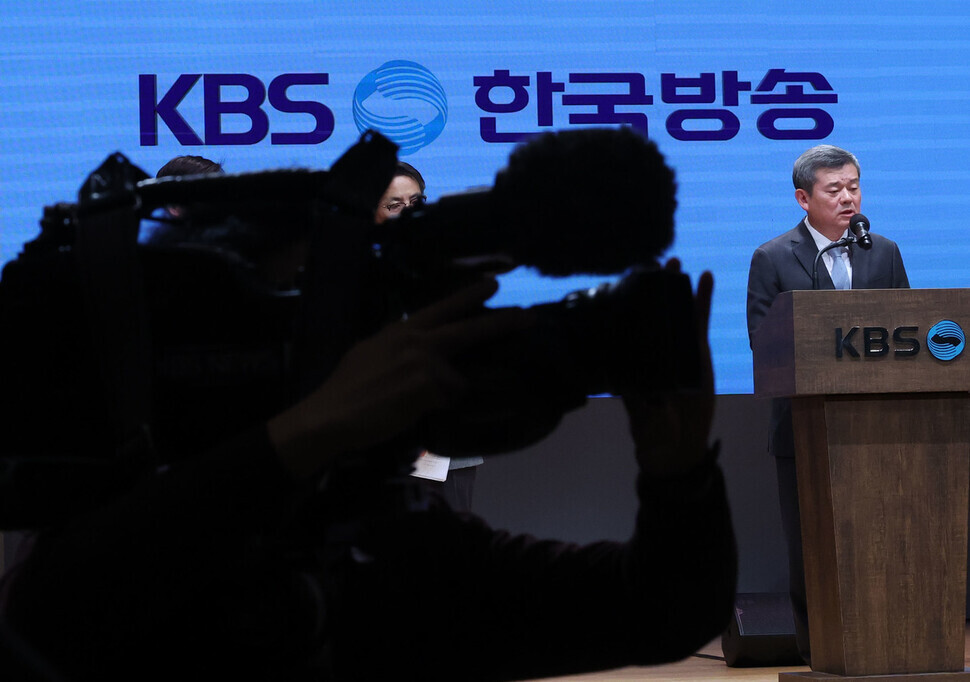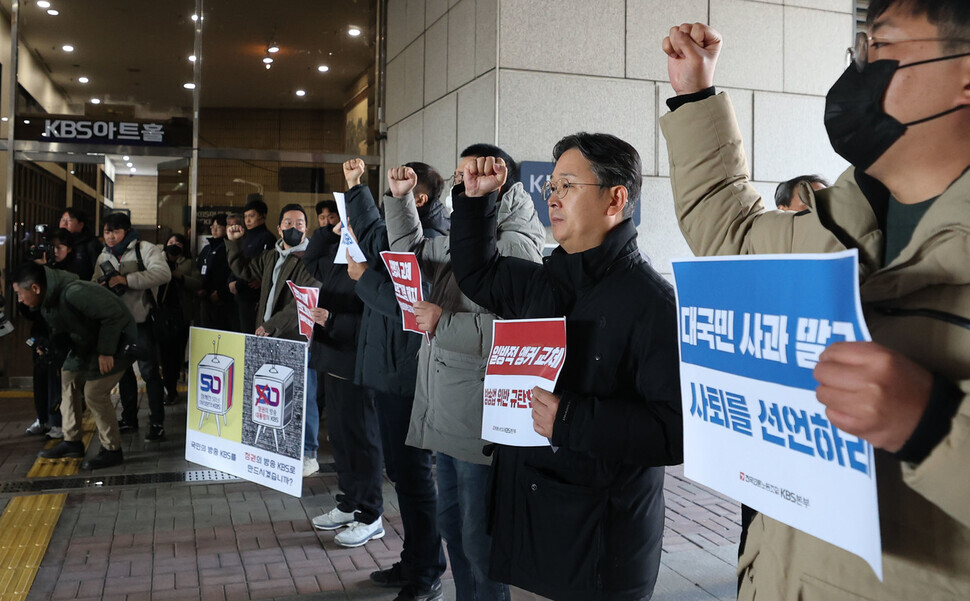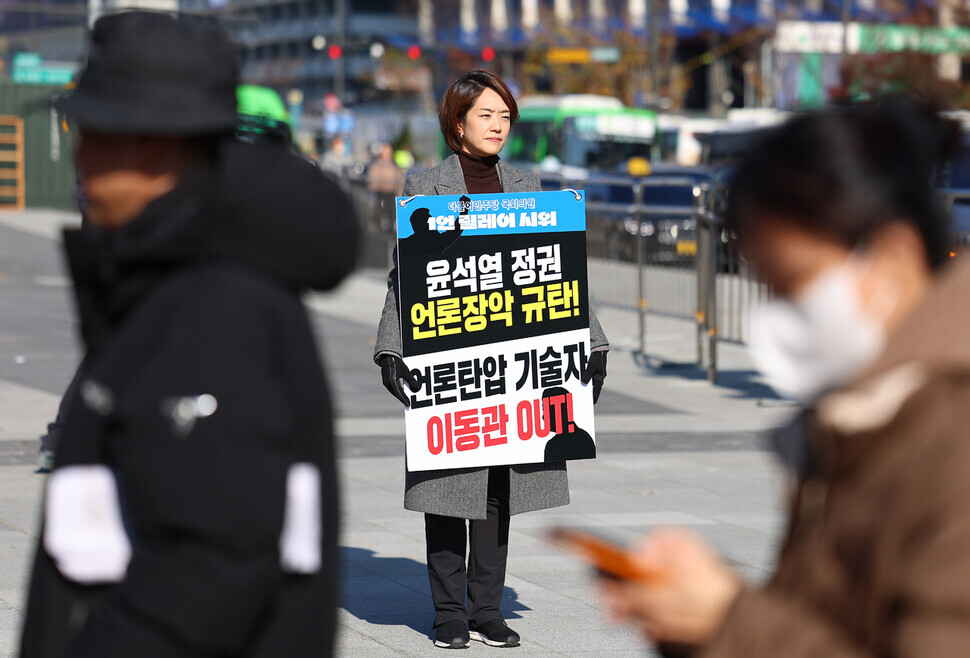hankyoreh
Links to other country sites 다른 나라 사이트 링크
Opposition rails against purges at KBS, likening new CEO to coup leader doing administration’s bidding

A mere two days into his tenure, Korean Broadcasting System (KBS) President Park Min held a press conference addressing the nation on Tuesday, announcing his plans to make additional personnel moves and changes in programming.
After placing a current affairs program that had been making reports critical of the administration on indefinite hiatus and replacing anchors for KBS’ top evening news program on his first day on the job, Park appears to be accelerating efforts to dominate public broadcasting.
The opposition fiercely criticized these developments, likening them to an “occupation operation” and a “coup,” while media experts expressed the concern that Park is abandoning press independence and freedom in deference to the presidential office.


During a self-billed “national press conference” on Tuesday morning, Park remarked, “I express my deep regret and respectfully apologize for [KBS’] loss of trust due to [its] forsaking of fairness, a core value for public broadcasters.” He then promised to thoroughly investigate how unfair reporting had been practiced and to what extent, as well as publish a white paper detailing relevant information. He also shared that reporters and producers who “caused public scandals through unfair, biased reporting” would face “strict disciplinary action.”
The unprecedented force and speed of Park’s purge at KBS has prompted a volley of criticism. During a floor strategy meeting that morning, Democratic Party floor leader Hong Ihk-pyo stated, “As soon as Park took office, the ‘KBS occupation operation’ proceeded with lightning speed. Anchors and hosts of current affairs and news programs like the 9 pm news and the radio show ‘Ju Jin-u Live’ were replaced without even being able to say goodbye to their viewers and listeners,” adding, “This is reminiscent of military coup d’états of the past like the May 16 coup.”
He continued, “A case like this has never existed unless the hosts committed illegal acts or caused public scandals,” pointing out, “Five showrunners of news, current affairs, cultural, and radio programs were sacked on the first day of Park’s tenure, and those positions are now empty. Violations of programming regulations and collective agreements have been occurring one after another ever since Park’s first day in office.”
In a commentary, Democratic Party spokesperson Kang Sun-woo noted, “The very people who need to overcome accusations of partisanship are Korea Communications Commission Chairperson Lee Dong-kwan, who called the ruling party’s leadership ‘our leadership,’ and Park, who is spearheading a ‘media coup d’état.’”

Park has taken action with unprecedented swiftness even compared to how quickly the Lee Myung-bak administration pushed for revisions of several pieces of media-related legislation, which set the foundation for the founding of general programming channels, in addition to seating figures amenable to the government on the board of directors and management of public broadcasters.
At the time in 2010, Lee Byung-soon, who filled the KBS presidency left vacant by Jeong Yeon-ju, quickly reshuffled personnel after taking office on Aug. 27, first replacing six general managers on Sept. 4 then soon after reshuffling 42 team managers and 97 team members on Sept. 8 and Sept. 17, respectively. While Lee Byung-soon’s reassignment of organizational members critical of authority was also criticized as “retaliatory” personnel decisions, it still fell short of the blitzkrieg carried out by Park.
As such, media experts say Park’s personnel reshuffle was not an independent decision made within KBS but an abnormal one prompted by the urgency felt within the presidential office and the ruling camp ahead of the general election.
“Television hosts being sacked overnight defies common sense. The replacement of hosts pointed out as problematic by a certain political party can only be seen as caused by outside pressure,” commented Sungkonghoe University broadcasting professor Kim Seo-joong, who previously served on the board of KBS.
“The motive behind the forceful measures taken by Park is to take control of KBS as soon as possible in order to set up an advantageous playing field for next year’s general election,” remarked Yonsei University Professor Emeritus Kang Sang-hyun, who formerly served as the president of the Korean Association for Broadcasting and Telecommunication Studies.
By Lee Jung-gook, staff reporter; Park Kang-su, staff reporter; Ko Han-sol, staff reporter
Please direct questions or comments to [english@hani.co.kr]

Editorial・opinion
![[Column] When ‘fairness’ means hate and violence [Column] When ‘fairness’ means hate and violence](https://flexible.img.hani.co.kr/flexible/normal/500/300/imgdb/original/2024/0516/7417158465908824.jpg) [Column] When ‘fairness’ means hate and violence
[Column] When ‘fairness’ means hate and violence![[Editorial] Yoon must stop abusing authority to shield himself from investigation [Editorial] Yoon must stop abusing authority to shield himself from investigation](https://flexible.img.hani.co.kr/flexible/normal/500/300/imgdb/original/2024/0516/4417158464854198.jpg) [Editorial] Yoon must stop abusing authority to shield himself from investigation
[Editorial] Yoon must stop abusing authority to shield himself from investigation- [Column] US troop withdrawal from Korea could be the Acheson Line all over
- [Column] How to win back readers who’ve turned to YouTube for news
- [Column] Welcome to the president’s pity party
- [Editorial] Korea must respond firmly to Japan’s attempt to usurp Line
- [Editorial] Transfers of prosecutors investigating Korea’s first lady send chilling message
- [Column] Will Seoul’s ties with Moscow really recover on their own?
- [Column] Samsung’s ‘lost decade’ and Lee Jae-yong’s mismatched chopsticks
- [Correspondent’s column] The real reason the US is worried about Chinese ‘overcapacity’
Most viewed articles
- 1Could Korea’s Naver lose control of Line to Japan?
- 2[Column] Welcome to the president’s pity party
- 3[Column] US troop withdrawal from Korea could be the Acheson Line all over
- 4Naver’s union calls for action from government over possible Japanese buyout of Line
- 5[Editorial] Korea must respond firmly to Japan’s attempt to usurp Line
- 6Korea cedes No. 1 spot in overall shipbuilding competitiveness to China
- 7[Editorial] Yoon must stop abusing authority to shield himself from investigation
- 8[Column] When ‘fairness’ means hate and violence
- 9Korean opposition decries Line affair as price of Yoon’s ‘degrading’ diplomacy toward Japan
- 10Second suspect nabbed for gruesome murder of Korean in Thailand, 1 remains at large